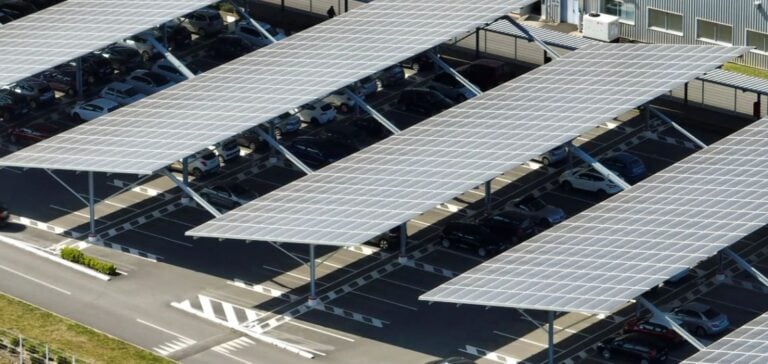The French Council of State is reviewing a request filed by eleven professional federations, including Carrefour, contesting a decree implementing the APER law. This law mandates that outdoor parking lots larger than 1,500 square meters cover 50% of their surface with photovoltaic canopies.
Unrealistic deadlines, say economic actors
The federations argue that the deadlines set by the decree, ranging from July 2026 to January 2028, are unachievable. According to Franck Charton, general delegate of Perifem, an association representing companies such as Carrefour, Casino, and Ikea, “the average time to install photovoltaic canopies is around 18 months per project.” Most companies affected by the regulation have not yet started the necessary work.
This delay, coupled with the limited production capacity of the French industry, will likely force stakeholders to import equipment, mainly from China. “These deadlines do not give the national industry enough time to respond to demand, increasing our dependence on foreign suppliers,” said Charton.
Controversy over the calculation of surface area
The federations also dispute the calculation method introduced by the decree. Initially, the law required coverage of 50% of parking spaces. However, the decree has expanded this requirement to include circulation lanes, which make up a significant portion of parking lot areas.
This adjustment effectively obliges operators to cover all parking spaces to comply, a constraint that Charton describes as “disproportionate and impractical.” These requirements also complicate infrastructure management, making it challenging for certain vehicles to navigate and limiting future possibilities for additional developments such as housing or tree planting.
Significant economic repercussions
Professionals warn of the financial implications of these new obligations. The investments required to comply with the regulation could heavily burden parking lot operators, particularly smaller businesses.
This situation reflects a broader challenge: balancing the government’s environmental ambitions with the economic and industrial realities faced by businesses. The federations hope that the Council of State will provide clarity and adjustments to the decree to strike a balance between ecological goals and economic feasibility.






















